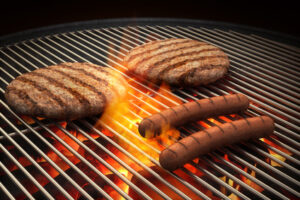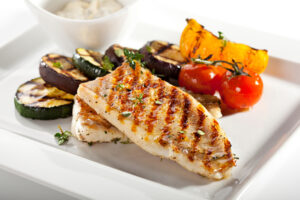Enjoy Your Cookouts Without Increasing Cancer Risk
Author: Dr. Stephen Chaney
 It is July and backyard cookouts are in full swing. One question that you probably won’t hear from your host or hostess is “Would you like cancer with that burger?” But perhaps that is exactly the question they should be asking.
It is July and backyard cookouts are in full swing. One question that you probably won’t hear from your host or hostess is “Would you like cancer with that burger?” But perhaps that is exactly the question they should be asking.
- You probably didn’t really want to know that when fat from the meat hits the hot coals, carcinogens form that are deposited on the meat.
- You probably also didn’t want to know that when you cook meat to high temperatures the amino acids in the meat combine to form cancer causing substances.
- And you really didn’t want to know that a recent study showed that men who consume well-done red meat were ~60% more likely to develop advanced prostate cancer.
Would You Like Cancer With That Burger?
 A recent study compared 531 people ages 40-79 who had recently been diagnosed with advanced prostate cancer with 527 matched controls. Both groups were asked about their dietary intake of meats, usual meat cooking methods and doneness of the meat.
A recent study compared 531 people ages 40-79 who had recently been diagnosed with advanced prostate cancer with 527 matched controls. Both groups were asked about their dietary intake of meats, usual meat cooking methods and doneness of the meat.
The results were quite striking:
- Increased consumption of hamburgers was associated with a 79% increased risk of advanced prostate cancer.
- Increased consumption of processed meat was associated with a 57% increased risk of advanced prostate cancer.
- Grilled red meat was associated with a 63% increased risk of advanced prostate cancer.
- Well done red meat was associated with a 52% increased risk of advanced prostate cancer.
However, those percentages are a little bit difficult to compare, because “increased consumption” was defined relative to what the usual consumption or cooking practice was. So put another way, weekly consumption of…
- 3 or more servings of red meat or…
- 5 or more servings of processed meat or…
- 1 or more servings of grilled or well-done red meat…
…were associated with a 50% increased risk of advanced prostate cancer.
In contrast, consumption of white meat was not associated with increased prostate cancer risk, no matter what the cooking method was used.
Enjoy Your Cookouts Without Increasing Cancer Risk
 Our local newspaper recently carried some tips by Dr. Denise Snyder from the Duke University School of Nursing on how you could reduce the risk of giving your guests cancer the next time you are the chef at your backyard cookout.
Our local newspaper recently carried some tips by Dr. Denise Snyder from the Duke University School of Nursing on how you could reduce the risk of giving your guests cancer the next time you are the chef at your backyard cookout.
Here are her suggestions:
- Grill fruits and vegetables instead of meat. That was her idea, not mine. My editorial comment would be that grilling white meat (fish or chicken) may also be OK.
- Use the lowest temperature that will cook your food thoroughly and keep the grill rack as high as possible.
- Use a meat thermometer so that you can make sure that as soon as the meat is thoroughly cooked you remove it from the grill. We usually overcook the meat to make sure that it is done.
- Shorten your grill time by microwaving the meat first, using thinner leaner cuts of meat or cutting up the meat and making kabobs.
- Trim as much fat from the meat as possible before you cook it.
- Line your grill rack with aluminum foil poked with holes. This allows the fat to drip down but minimizes the exposure of the meat to the carcinogens formed when the fat hits the coals.
- Marinate your meats before grilling. That has been shown to reduce the formation of cancer-causing chemicals.
- And, of course, avoid processed meats like hot dogs and sausage completely because they have been shown to increase the risk of cancer and diabetes no matter how they are cooked.
So, here’s to a healthier cookout. Bon appétit!
The Bottom Line
- You already knew that red meat and processed meats may increase your risk of cancer, but how you cook your red meat also matters. Grilling your meat and/or cooking it until it is well done appear to significantly increase your risk of developing advanced prostate cancer.
2) In contrast, consumption of white meat was not associated with increased cancer risk, no matter what the cooking method was used.
3) I have included several tips on how you can reduce the cancer risk associated with grilling red meats in the article above so you can enjoy both your cookouts and your health.
For more details about this study and what it means for you, read the article above.
These statements have not been evaluated by the Food and Drug Administration. This information is not intended to diagnose, treat, cure, or prevent any disease.
